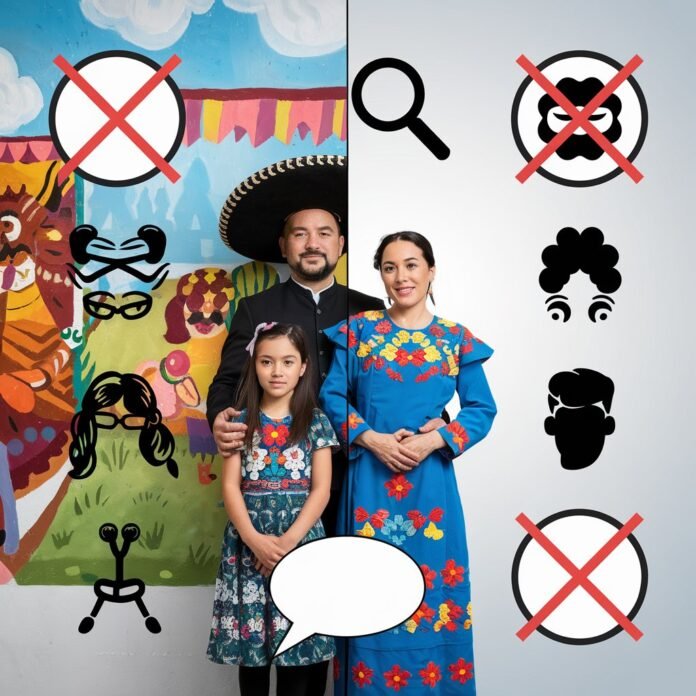Introduction
The use of slurs and derogatory language can have profound impacts on individuals and communities. In this comprehensive article, we explore the topic of “Mexican slurs,” delving into their origins, implications, and the broader context of their usage. We aim to provide a thorough understanding that surpasses existing sources, offering insights and analyses to educate readers and promote a more respectful discourse.
Spanish slurs and stereotypes against Mexican-Americans in the USA involve derogatory terms and images that reflect historical prejudices and cultural appropriation. Adam M. Croom provides a context-sensitive analysis of these issues, examining how such derogation persists and impacts individuals and communities.
What Are Mexican Slurs?
Mexican slurs are derogatory terms used to demean or belittle individuals of Mexican descent. These slurs often reflect deeper societal prejudices and can perpetuate harmful stereotypes. They may be used in various contexts, including casual conversation, media representations, and even institutional settings.
Historical Context and Origins
To fully grasp the impact of Mexican slurs, it’s essential to understand their historical and cultural origins:
- Colonial Legacy: The derogatory terms used against Mexicans have roots in the colonial period, where racial hierarchies were established. The legacy of colonialism has influenced how Mexicans and Mexican-Americans are perceived and treated.
- Mexican-American War: The 19th-century conflict between the United States and Mexico contributed to the development of stereotypes and derogatory language. The war reinforced negative perceptions of Mexicans in American society.
- Cultural Stereotypes: Throughout history, Mexicans have been stereotyped in various ways, from lazy laborers to criminals. These stereotypes have given rise to specific slurs that reflect these negative images.
Common Mexican Slurs and Their Implications
Understanding specific slurs and their implications helps in addressing and combating their use. Some common Mexican slurs include:
- “Beaner”: This term is derived from the stereotype that Mexicans eat a lot of beans. It is used to demean Mexicans based on a food-related stereotype and is considered highly offensive.
- “Mexican” (Used Derogatorily): In some contexts, the term “Mexican” is used pejoratively, stripped of its identity value and employed to insult or belittle.
- “Cholo”: Originally used to describe a specific subculture, “cholo” has been appropriated as a derogatory term implying gang affiliation or criminal behavior.
The Impact of Mexican Slurs
The impact of using Mexican slurs extends beyond mere offense. They contribute to:
- Mental Health Issues: Being targeted by slurs can lead to stress, anxiety, and depression. The emotional toll can affect an individual’s well-being and quality of life.
- Social Exclusion: Slurs can foster social exclusion and marginalization, making it harder for individuals to integrate and feel accepted in society.
- Reinforcement of Stereotypes: The continued use of slurs perpetuates harmful stereotypes, reinforcing negative perceptions and prejudices against Mexicans and Mexican-Americans.
Addressing and Combatting Mexican Slurs
Efforts to address and combat the use of Mexican slurs involve various strategies:
- Education and Awareness: Educating people about the historical and cultural context of slurs can foster understanding and empathy. Awareness programs can help people recognize the impact of their language and promote more respectful communication.
- Media Representation: Positive and accurate representation of Mexicans in media can counteract stereotypes and reduce the prevalence of slurs. Media plays a crucial role in shaping public perceptions and attitudes.
- Legislation and Policy: Anti-discrimination laws and policies can provide legal frameworks to address hate speech and protect individuals from derogatory language. Organizations and institutions can implement policies to prevent and respond to the use of slurs.
- Community Support: Support from community organizations and advocacy groups can help address the effects of slurs and provide resources for those affected. Community-driven initiatives can promote inclusivity and respect.
Legal and Ethical Considerations
The use of slurs raises both legal and ethical questions:
- Free Speech vs. Hate Speech: In democratic societies, the balance between free speech and hate speech is a complex issue. While individuals have the right to express their opinions, hate speech that targets specific groups can have harmful effects and may be subject to legal restrictions.
- Ethical Responsibility: Ethically, individuals and institutions have a responsibility to avoid using language that perpetuates harm or discrimination. Promoting respect and understanding is crucial in fostering a more inclusive society.
Case Studies and Examples
Examining real-life examples and case studies provides insight into how Mexican slurs are used and the responses to them:
- Educational Settings: Schools and universities have addressed the use of slurs through educational programs and anti-bullying initiatives. These efforts aim to create safe environments for students of all backgrounds.
- Workplace Discrimination: In the workplace, the use of slurs can lead to legal actions and the implementation of diversity and inclusion programs. Companies are increasingly focusing on creating respectful and inclusive work environments.
- Social Media: The rise of social media has amplified the use and visibility of slurs. Online platforms are implementing policies to address hate speech and provide tools for reporting and combating derogatory language.
FAQs About Mexican Slurs
1. What are Mexican slurs?
Mexican slurs are derogatory terms used to insult or belittle individuals of Mexican descent. They often reflect harmful stereotypes and prejudices.
2. Why is it important to address Mexican slurs?
Addressing Mexican slurs is crucial because they contribute to social exclusion, mental health issues, and the reinforcement of negative stereotypes. Combatting them promotes respect and inclusivity.
3. How can I respond if I hear a Mexican slur?
If you hear a Mexican slur, respond calmly and assertively, explaining why the term is offensive and promoting respectful language. Support from others can also help address the issue.
4. What role does education play in combating Mexican slurs?
Education helps people understand the historical and cultural context of slurs, fostering empathy and reducing the likelihood of using derogatory language. Awareness programs can promote respectful communication.
5. Are there legal consequences for using Mexican slurs?
In some jurisdictions, using slurs may be considered hate speech and can lead to legal consequences. Anti-discrimination laws and policies may provide legal frameworks for addressing and penalizing hate speech.
Conclusion
Understanding Mexican slurs and their impact is essential for fostering a more inclusive and respectful society. By examining their origins, implications, and strategies for addressing them, we can work towards reducing the prevalence of derogatory language and promoting a culture of respect. Education, media representation, and legal frameworks play crucial roles in combating slurs and supporting affected individuals. Through collective efforts, we can create a more equitable and empathetic society.




